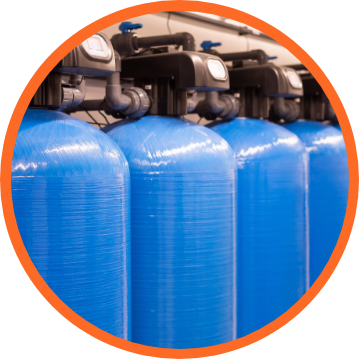Rare Breed Plumbing installs lasting water softeners in Bountiful, UT. We can provide an immediate solution if you value clean, usable soft water free of harmful minerals. These toxic minerals erode and worsen the condition of your plumbing pipes, releasing nothing but hard water. However, we can get you an immediate solution with a water softener installation.
Water Softeners in Bountiful, UT
Call For More Details

Understanding How Water Softeners Work
Water pipes used for plumbing have different lifespans that depend on multiple factors, such as the material of the pipe, water quality, and frequency of usage. For example, copper pipes last much longer than PVC pipes.
These pipes undergo natural wear and tear over time, which is usually a slow and gradual process. However, when hard water passes through the pipes, the condition of the pipes deteriorates much faster. It is due to the harmful minerals present in hard water.
When you use your showers or sinks, hard water is formed from the dissolved calcium and magnesium in your faucets. The hardness of water can be measured based on the concentration of minerals present in a sample.
As water passes through the pipes, the minerals form deposits, causing blockages and allowing hard water to flow. Nevertheless, using water softeners can help alter the composition of these minerals. It means that residents of Bountiful can now enjoy soft water at all times.
- Compromise appliances
- Dry skin and dull hair
- Premature plumbing repair
- Increased water heating demands
It can be challenging for soap and detergents to lather in hard water, leading to longer boiling times, higher energy bills, and damage to heating appliances.
However, you can solve these issues by requesting a water softener installation from Rare Breed Plumbing. It will help prevent further degradation of your plumbing pipes, improve soap lathering, and leave your skin feeling much better.
A successful installation can also reduce your heating energy costs, eliminate scale buildup from your pipes, and extend the lifespan of your appliances.
It’s important to note that hard water doesn’t simply disappear after installation. Instead, water softeners use ion exchange to remove harmful minerals from hard water with the help of resin beds. Over time, a regeneration process ensures that the resin bed maintains its ability to provide you with soft water through a rinse cycle, which eliminates any residual brine solution.
Water Softener Installation in Bountiful
At Rare Breed Plumbing, we are selective when hiring new team members, but we take great pride in being an integral part of the local community here in Bountiful.
Our goal is to provide the best possible service to everyone, which is why we only employ the most highly skilled plumbers. If you’re experiencing plumbing issues related to hard water in Bountiful, don’t hesitate to contact us. We offer top-quality water softener installations that will solve your hard water problems for good.
Call Rare Breed Plumbing today and say goodbye to hard water when we install water softeners in your Bountiful home!
©2024 Rare Breed Plumbing. All Rights Reserved. License: # 11166591-5501.